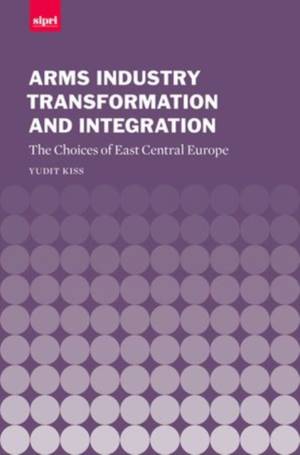
- Afhalen na 1 uur in een winkel met voorraad
- Gratis thuislevering in België vanaf € 30
- Ruim aanbod met 7 miljoen producten
- Afhalen na 1 uur in een winkel met voorraad
- Gratis thuislevering in België vanaf € 30
- Ruim aanbod met 7 miljoen producten
Zoeken
Defence Industry Transformation and EU and NATO Enlargement
The Choices of Central Europe
Yudit Kiss
€ 111,45
+ 222 punten
Omschrijving
The defence industry was one of the pillars of the classic command economy system in Central Europe. Since the early 1990s the sector has gone through dramatic changes. It was radically downsized, reorganized and restructured according to the needs of the emerging new socio-economic systems. One of the major factors that shaped this adjustment was the enlargement of NATO and the European Union and the prospect of integration into these two organizations. The military establishments and defence industries became principal actors in the integration process, which helped them to acquire new economic resources and political legitimization. At the same time, integration presented unexpected new challenges and constraints for the restructuring defence industry in the region. This report describes how the defence industry adjusted to the changed political and economic environment in both the domestic and international context. The comparative analysis of the post-cold war experience of six Central European countries - Bulgaria, the Czech Republic, Hungary, Poland, Romania and Slovakia, which joined in the first two waves of enlargement - provides valuable lessons for other countries in their processes of socio-economic transformation.
Specificaties
Betrokkenen
- Auteur(s):
- Uitgeverij:
Inhoud
- Aantal bladzijden:
- 454
- Taal:
- Engels
- Reeks:
- Reeksnummer:
- nr. 23
Eigenschappen
- Productcode (EAN):
- 9780199271733
- Verschijningsdatum:
- 24/06/2014
- Uitvoering:
- Hardcover
- Formaat:
- Ongenaaid / garenloos gebonden
- Afmetingen:
- 239 mm x 160 mm
- Gewicht:
- 839 g

Alleen bij Standaard Boekhandel
+ 222 punten op je klantenkaart van Standaard Boekhandel
Beoordelingen
We publiceren alleen reviews die voldoen aan de voorwaarden voor reviews. Bekijk onze voorwaarden voor reviews.











